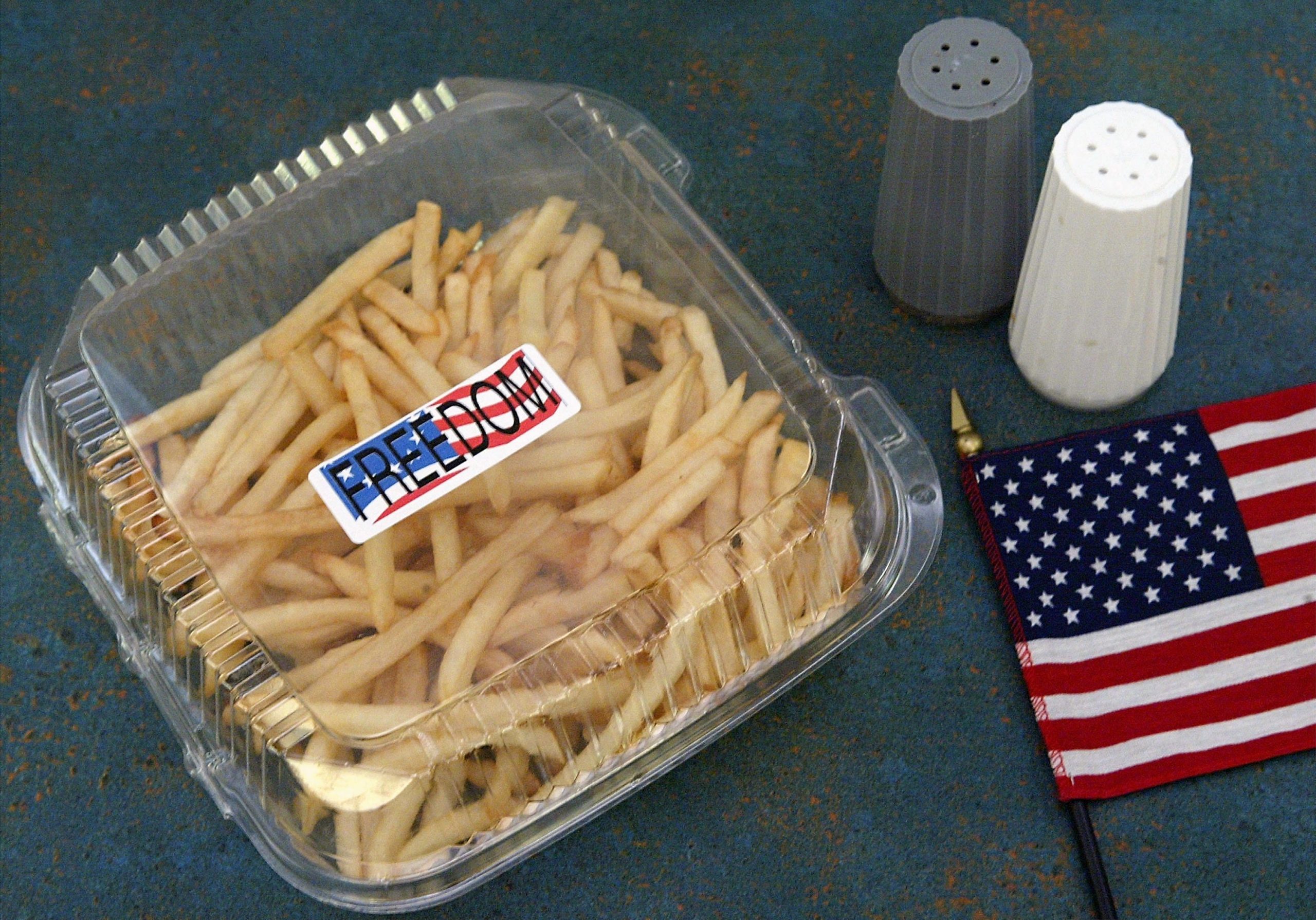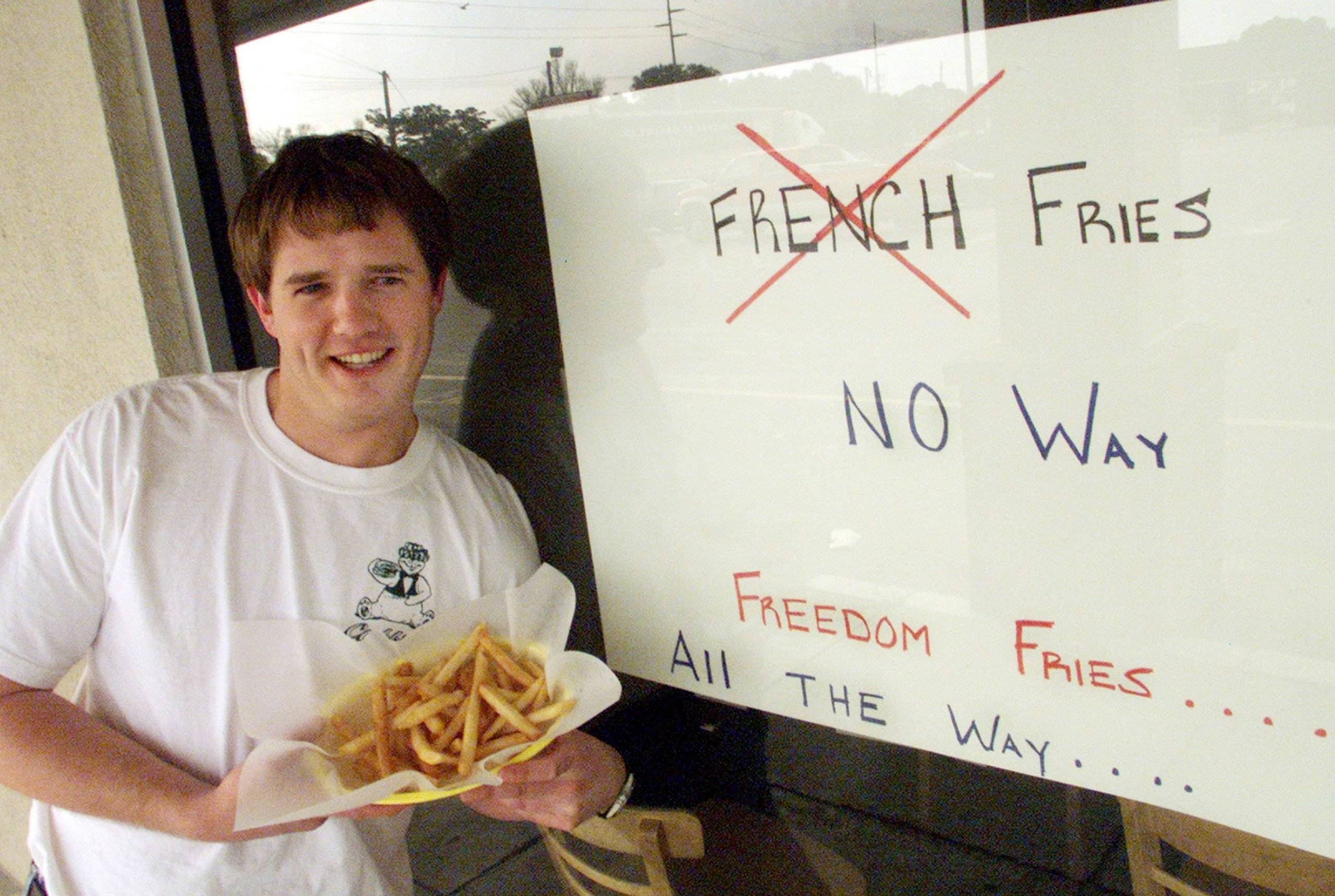
(Photo by Alex Wong/Getty Images)
- The GOP has called for a boycott of Coca-Cola after the company disparaged Georgia's new voting law.
- This is not the first time the GOP has deemed food products unpatriotic.
- In 2003, GOP Rep. Bob Ney renamed French fries "freedom Fries" in congressional cafeterias.
- See more stories on Insider's business page.
See if this sounds familiar: Republicans get upset over an entity that publicly disagrees with one of their policies. They call for a boycott and rename and mock products originating from the objecting party, attempting to shame them into a reversal.
GOP congressmen and their supporters hit the airwaves, making half-threats and jingoistic calls for obedience as a distraction. Oppositional outrage over the actual policy is sidelined in favor of a discourse of pettiness and blame.
We're not talking about Woke Coke here. We're talking about french fries.
In the 18 months following the September 11, 2001 terror attacks, then-President George W Bush assembled a "coalition of the willing" with the aim of invading Iraq (a country that had nothing to do with the unprecedented attacks) and removing President Saddam Hussein from power.
While Bush enjoyed fairly broad domestic support as Americans rallied behind his administration, the view from Europe – which had its own history of terrorism – was more nuanced, and many countries didn't buy the "either you are with us, or you are with the terrorists" line Bush made famous in a speech to Congress in the weeks after the attacks.
The Orwellian sloganeering coming from the White House fell on a lot of deaf ears. And at least one pair of them belonged to French Foreign Minister Dominique de Villepin, who, as a member of the United Nations Security Council, pledged to veto any resolution mandating an invasion of Iraq and refused to provide military support to the coalition.
De Villepin said the US, which was represented at the UN by then-Secretary of State Colin Powell, had failed to convincingly connect the dots between Osama Bin-Laden's Al-Qaeda and Iraq, or show any evidence the country had weapons of mass destruction.
This did not go over well with Republicans. But unlike the canceling of Coke, this campaign started with a constituent, Neal Rowland, a North Carolina restaurateur.

(Photo by Chuck Beckley/Getty Images)
Rowland, the owner of Cubbie's, a sports bar in Beaufort, NC, came up with the idea to rename the foodstuff as "freedom fries," citing the anti-German sentiment that led to the renaming of sauerkraut as "liberty cabbage" and frankfurters as "hot dogs" during WWI (though the term "hot dog" was coined in the late 1800s, and not as a reaction to the assassination of Archduke Ferdinand).
"Since the French are backing down, french fries and french-everything needs to be banned," Rowland told Fox News in 2003. "Fry sales have really gone up," he said. "People who eat them now say, 'Freedom never tasted so good.'"
The french toast at Cubbie's was also renamed, though "Freedom Toast" lacked alliterative appeal and never quite caught on.
As publicity stunts go, Rowland's patriotic ploy worked, catching the attention of North Carolina GOP Rep. Walter B. Jones. A staunch proponent of the war, Jones contacted Rep. Robert W. Ney, who, as chairman of the House Administration Committee, was in charge of restaurants in the Capitol.
"I wasn't going to try to make an issue out of it, but my chief of staff said, 'Just write Bob Ney; he'll just throw it in the trash can,'" Jones told the Russian news agency RT in 2011.
By all accounts, Ney made a unilateral decision, a trendy move at the time, and ordered the cafeterias to strike the adjective "french" from both fries and toasts alike in lieu of the modifier "freedom," which was considered more appetizing.
What was supposed to be a "lighthearted gesture" turned into a media frenzy, with a slew of reporters showing up for the rededication of oil-encrusted tubers. "This action today is a small but symbolic effort to show the strong displeasure many on Capitol Hill have with our so-called ally, France," Ney said at a news conference at the cafeteria.
The idea of "freedom fries" resonated with the public to the point where French officials had to entertain questions about the initiative.
''Honestly," Nathalie Loiseau, a spokeswoman for the French Embassy, told The New York Times in 2003, "We are working these days on very, very serious issues of war and peace, life or death. We are not working on potatoes.''
This was not a short-lived phenomenon: Freedoms fries and toast remained on the menu at the Capitol until July 2006. "Freedom" as it turns out, is a fantastic rebranding strategy.
Jones, who died on his birthday in 2019 and whose obituary in The Standard was headlined, "US lawmaker known for 'freedom fries' and 'freedom toast' dies," eventually recanted his support for the war, and for patriotic potatoes: "Because I did not do my job then," Jones said, "I helped kill 4,000 Americans, and I will go to my grave regretting that."
Rowland also softened his position after a time, saying his initial impulse was "about supporting our troops. Nothing has changed here. We still support our troops, and we still call them freedom fries."
Cubbie's closed in 2009. The last Yelp entry reads, "A restaurant that fueled hatred towards the french for not supporting our war in Iraq... 1 star that's all you get.."
As for Bob Ney, he resigned from Congress after pleading guilty to charges of conspiracy in relation to the Jack Abramoff Indian lobbying scandal and served 17 months in prison. He now hosts a podcast.
France remains a country, with a GDP of 2.7 trillion per year, while Coca-Cola squeaks by with around $35 billion. Odds are they both survive Republican cancel culture. Freedom may taste good, though ultimately, a fry by any other name tastes just as salty.